
The Project Gutenberg eBook of X-mas Sketches from the Dartmouth Literary Monthly, by Edwin Osgood Grover
Title: X-mas Sketches from the Dartmouth Literary Monthly
Author: Edwin Osgood Grover
Release Date: March 15, 2023 [eBook #70291]
Language: English
Produced by: Bob Taylor, Tim Lindell and the Online Distributed Proofreading Team at https://www.pgdp.net (This book was produced from images made available by the HathiTrust Digital Library.)

IN GREEN AND WHITE—VOL. I.
FROM THE
Dartmouth Literary Monthly.
EDITED BY
EDWIN OSGOOD GROVER, ’94.
CONCORD, N. H.:
REPUBLICAN PRESS ASSOCIATION.
1893.
Copyrighted, 1893,
By Edwin Osgood Grover.

| Medallion of Old Pine | Frontispiece |
| Suite Four | 1 |
| Our Winter Birds | 15 |
| A New Year’s Legacy | 29 |
| By Proxy | 47 |
| In the Shadow of Sheep Mountain | 61 |
| Christmas Eve,—A Fantasy | 87 |
| Clancy’s Home-Coming | 103 |
| Music Hath Charms | 115 |
| The Sprig’s Ball | 129 |
| Christmas Eve at the Club | 145 |
[Pg v]
Just a word in regard to this little book, which we venture to add to the more pretentious undergraduate literature. The sketches and illustrations are those which appeared in the Christmas number of The “Lit.” We do not present them as masterpieces, but merely as representing the present literary work in college along the line of fiction. Several of the stories are their author’s “first appearance,” and the thumb-nail sketches are the first attempt, we believe, at college magazine illustrating. It is hoped that other volumes[Pg vi] may in time be added, forming an “In Green and White” series. If this vest-pocket volume serve as a souvenir of The “Lit.” and an incentive to story-telling, it is well.
E. O. G.
Hanover, N. H.,
December, ’93.
[Pg 1]
[Pg 3]
SUITE FOUR.
H. C. Pearson.
{Illustrations by E. V. Spooner.}

Ted Tracy sat in his little back room, gazed out of the window, and sighed. The sighing was not consequential upon the gazing, though it might well have been, for four walls of windows about a roofed-in court, with a grey sky sullenly peering in three stories higher, does not form a remarkably cheerful spectacle; not even when compared with a ten-by-twelve room containing[Pg 4] as its sole ornaments a folding bed, a commode, three chairs, and a mirror. But Ted’s usually buoyant soul would have risen above these surroundings, as easily as the curls of his cigarette smoke; something much more depressing squeezed out that sigh.
Six months before, this young graduate of a fresh-water college had come to Boston and entered upon the twin pursuits of journalism and agriculture. As a newspaper man, he had so far succeeded in earning the munificent salary of $6 per week, which almost paid for his room, his laundry, and his cigarettes. As a farmer, he had sown with signal success one of the finest[Pg 5] lines of wild oats in the city, and was now finding some difficulty in their gathering. His only relative—the rich old uncle common to all fairy tales—had hitherto settled the periodical deficits in his accounts with unfailing good humor and abundant generosity; but now he had suddenly thrown up his role of good genius, objecting, perhaps, to being used as a patent reaper.

So Ted sat and gazed and sighed; sometimes, to vary the monotony, he swore. The French dancers from the “Black Crook,” who[Pg 6] roomed next door, were screeching some Parisian street song as grotesque and inharmonious as their acrobatics. The parrots and macaws in the bird store down stairs answered them back with scarcely more discordance; and between them Ted felt sure his environment would drive him to suicide or drink.
Before he had time to grasp either horn of the dilemma, however, a knock at the door ushered in one of his few welcome visitors. The little dark chorus girl in “Venus,” who roomed with her mother two doors beyond, was pretty enough to attract Ted’s attention the first time they met, and modest and womanly enough in a sweet, old-fashioned[Pg 7] way to retain, not only his earnest admiration, but his hearty respect. This afternoon she was bubbling over with happiness, so much so that she never noticed Ted’s lugubrious expression.
“Oh! Mr. Tracy,” she began at once, “I’m to have a part to-night. Mr. Rice and Miss Tinnie have had a row, and I’m to do Absurdaria. You know I’ve understudied it all the season; and, Mr. Tracy, mother wants to see it so much, but she can’t go alone very well; and could you—would you—be her escort? I’ve the tickets; and it will be so kind of you.”
“With the greatest pleasure,” said Ted, as she stopped for breath. “I[Pg 8] should never have forgiven you if you had not allowed me to share in your first night’s triumph.”
“Oh, nonsense!” replied the girl, with a charming blush. “But I must not, will not, fail with mother there. And I should like to please you, too,” she added shyly.

So Ted put on his dress suit, spent the evening in an orchestra stall at the Park, by the side of dear little old Mrs. Burnham, and was as proud and happy as she at “her Eva’s” success, for although the Princess Absurdaria is not the most attractive part in a “comic[Pg 9] opera” that has many superiors, still the newcomer in the cast was so pretty and graceful and young that the crowded house noticed the change at once, and manifested its approval many times. So great was her success, indeed, that the mighty Poom condescended to crack a joke about it, and the shapely star herself took a thorough mental inventory of the new favorite.
When the performance was over Ted and Mrs. Burnham waited for Eva at the stage door, and they all walked home together in the clear, crisp November night. After his congratulations had been gracefully tendered and prettily accepted, Ted was silent, trying a plan for a little[Pg 10] supper for his companions; but Mrs. Burnham relieved his perplexity.
“You must stop in for a bit of lunch with us, Mr. Tracy,” said she. “I’ve gotten up a little surprise for Eva, and we both want you to share it, too.”
A dainty little supper it was, more cosy and homelike and wholesome than anything Ted had experienced for years. Alone with these simple friends, his foolish conceits melted away, and the good side of his nature was revealed as it had never been before in Boston. They were all very chatty and confidential. Ted told his troubles, and was tenderly pitied by Eva and wisely advised by her mother. Then the latter,[Pg 11] in spite of her daughter’s remonstrances, told their story—how her husband had died when she herself was ill three years before, and how Eva, finding the burden upon her shoulders, had pluckily taken it up and supported her mother in comfort by her wages as a chorus girl.
“It’s been hard sometimes, dearie,” said Mrs. Burnham, as she stroked her daughter’s wavy hair, “but the worst is over now; and, thank God, you are as true and pure a girl as the first night you saw the foot-lights.”
Ted went back to his little room with a lighter, braver heart than he would have thought possible six hours before. The next day and[Pg 12] for many succeeding days he went at his work with a dash and vim that could not help bringing success. And when, as often he was, tempted to go back to his old ways, a pair of clear brown eyes seemed to look out of a piquant, merry face straight into his, and to make him refuse with almost rude abruptness.
In the spare moments, that before he would have more than wasted, he wrote out with tender reverence the life-story Mrs. Burnham had told him. His heart was in his work, and the result was a touching and really well-written little tale. A great New York editor thought it was so good, in fact, that he promptly mailed Ted a check for $25 and[Pg 13] promised his effort immediate publication. When it did appear the author read it to the principal characters, who listened with tear-wet eyes, and immediately decided that Ted was without doubt the American Dickens.
Its further effect was apparent a few days later, when a gruff but kindly letter was received from Uncle John. One of its paragraphs was as follows:
“I was much pleased with your story in the Cosmopolitan. The heroine is, I suspect, a flesh and blood girl of your acquaintance. If she will marry you, I will settle $2,000 a year on her and change my will again.”
[Pg 14]
Ted repeated the words to Eva just as they reached her door, after the walk home from the theatre one night.
“Can we live on $2,000 a year?” he asked with a smile, but gravely.
The girl grew pale and trembled; but when she looked up shyly and sweetly into his ardent eyes there was no need for words. With a happy sigh she threw her arms around his neck, and their lips met for the first time.

No one was ever so near heaven before as the happy pair which New Year’s found in dingy, stuffy old Suite Four.
[Pg 15]
[Pg 17]
OUR WINTER BIRDS.
Robert A. Campbell.
{Illustrations by H. M. Chase and H. H. Gibson.}
It is not remarkable that poets and bird-lovers consider the spring of the year preëminently the season in which birds are to be studied and admired. The change from the winter to the spring, from the sombre to the variegated, the harmony that wakes the silent woods, the dreamy south wind that mellows the air,—in truth, all life, awakening, seems to be striving to render nature beautiful and[Pg 18] attractive. To say that spring-tide is not the best season of the year for studying birds would be indicative of ignorance; but to say that spring is the only season in which birds may be profitably studied, would show an equal lack of knowledge.

When the leaves redden and fall, the birds that greeted us so joyously six months before begin to disappear.[Pg 19] Silently they depart, dreading the rigor of the winter, seeking a warmer and a sunnier clime. No longer is the dawn betokened by their chorus; yet we are far from being entirely deserted, as there are over fifty species that brave the cold weather with us. These winter birds are generally from the north, spending their summers in Labrador or the Hudson Bay region, and finding a warmer and more congenial resort in the pine and hemlock vales of New England. On the other hand, there is a very respectable minority who make this their permanent home. A sunny day suffices to bring several kinds of them into the village, and then only are they[Pg 20] observed by the multitude, though a few, more interested and zealous, know where to find them at other times.
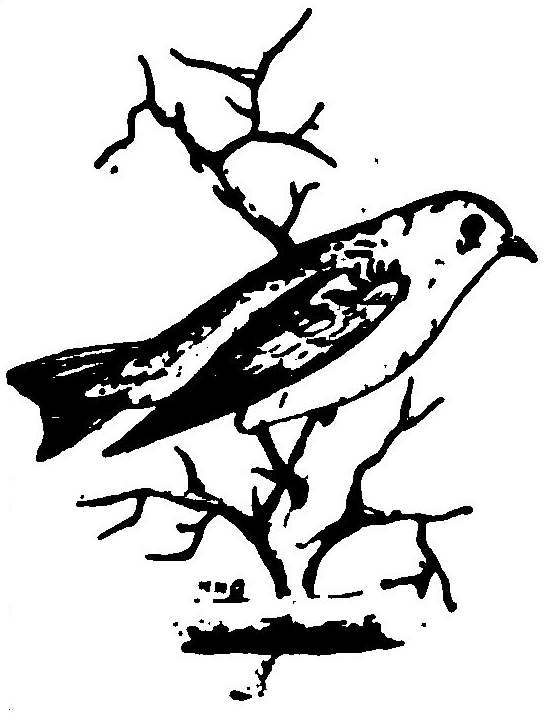
Between January and March I am never unable to find flocks of the pine grosbeak; they are generally found in the college park, but if not there, they will be in Webster glen, or surely on Balch hill. None of the birds that spend the winter with us receive so much notice as these, on account of the frequency with which they visit the village in search of the seeds of frozen fruit, or the buds on evergreen trees. A low mellow whistle apprises the pedestrian of the proximity of the grosbeak, and the bird is quickly[Pg 21] discovered, probably with from six or eight to thirty companions, that gradually show themselves to the admiring observer. About the size of a robin, the females are distinguished by a soft yellow coloring, which becomes a brilliant scarlet in the male. It is at once noticed that there are about five females to one male, which is natural, when we consider that the male is the hardier bird, and for that reason often remains behind in the northland. It is sometimes called the “Canadian robin” about here. I did not appreciate the fitness of[Pg 22] the name until last February, when I found a half dozen of them apparently leading three half-frozen and half-starved robins to a place where they might find food. They are of about the same size, and fly in a manner very like the robin, so that a careless observer might very naturally consider them a kind of robin. Last winter they arrived on the 14th of November, and stayed until the 21st of March. It was perhaps a trifle strange, that on the 22d of March, the very day after the last grosbeak was seen, the spring migration began with the arrival of robins and bluebirds.
Though I have never heard the grosbeak sing, yet, at the setting of[Pg 23] the sun on some of the warmer March days, I have listened to some of their low, liquid warblings that were marvels of sweetness, and proved to my mind their right to be considered among the finest of our singing birds.

The grosbeak has a cousin smaller than himself and rarer, that is equally interesting, the American red crossbill. During the past two years a large number of these birds have spent the months of January and February in the park, and on account of their accessibility have furnished me many interesting notes. In general coloring[Pg 24] they closely resemble the grosbeak, but they are scarcely two thirds its size. Their crossed bills, which furnish them their common name, are their most noticeable and interesting characteristic. It is a spectacle as pretty as it is curious to see one take the seeds from the cone of a fir tree. The hooked upper mandible serves to catch hold of and tear out the seed, while the lower one is a receptacle for it. With the red crossbill is sometimes seen the white species, which is much the rarer visitant of the two.
But if mention is to be made of any representative winter birds, we must notice the chickadee. A rugged little fellow, undaunted, though[Pg 25] the weather be ever so cold, he salutes us almost everywhere, and as he passes busily from tree to tree, seeking his sustenance, he makes his little remarks in a business-like way, occasionally approaching his admirer with a confidential message, which he rattles off and then flits away to join some bon camarade. The chickadees, on account of their excellent temper and character, make many friends, and we frequently find nuthatchers, kinglets, sparrows, and other small birds about with them.

That these birds are forced to be gregarious, in order to protect themselves from hunger and cold, is well illustrated by the fact that the snowbirds[Pg 26] and pine linnets occasionally swoop down upon us in flocks of two to three hundred. If one searches the wooded hills at some distance from the town, rarer species of owls and the like may be found with partridges, occasionally Canada jays, and during especially severe winters straggling Arctic birds. Indeed, one can hardly walk abroad without having his interest well repaid, and rare finds and new discoveries are of sufficient frequency to keep the observer enthusiastic. I think I was first attracted to these cold weather observations[Pg 27] from selfish motives, for there was a great charm to me in walking through pathless fields of snow, and feeling, from the absence of human footprints, that no one else was seeing what I saw and enjoying what I enjoyed; and if a few days later I went over the same ground and found no tracks but my own, this pleasure was increased. There is something peculiarly fascinating in an interesting solitude.

[Pg 30]
[Pg 31]
A NEW YEAR’S LEGACY.
John H. Bartlett.
{Illustrations by F. H. Trow.}

Now, Dan, you must try to do your best to-night. There will be heaps o’ people at that speaking, and Squire Barnard’s hall will be full, and I fear how you might be kind o’ shakey when you see ’em all looking at yer, boy. But be brave and powerful smart to-night, Dan, and maybe, some day, somebody’ll do ye a good turn, and ye might get[Pg 32] a bit more learning.” These were the words that broke the deep quietness of a strangely impressive hour in a home freighted with ill fortune and cursed by nearly every event. It was in the days of early American life when Puritan simplicity and colonial customs held society in a more natural state, and allowed the highest and lowest a more ready approach. But the home of Dan Kenashton, though decent, was the simplest of the simple, and the most unpretentious of the unpretending. And on that November evening long ago, when, in other home-circles the “husking bee,” the evening kitchen party, and other ancestral pastimes told of pleasantly passing days, in[Pg 33] this there lurked a legend of something wrong. The roughly hewn timbers which presented their ugly faces to the two inmates, in the two solitary rooms of this weird old cot seemed to speak curses on whomsoever was within. Even the dusty old motto, “God Bless Our Home,” which hung over the crude board shelf, seemed to bear an ill-omened import. Beside it was a well kept picture, a battle scene. Brave men were defending a fortification, amid snow and sleet and fire and lead, against an insidious attack by the Muskigo tribe on New Year’s eve. ’Neath the feet of those still contending lay the bleeding bodies of those who had fought their last.[Pg 34] Did this have any special meaning in that home? If so, surely war is honorable, and to die in loyal defence leaves not a stigma upon one’s posterity. An old flintlock musket stood in the corner. It had not the appearance of recent use; the hammer was rusty and flintless; the bayonet was blunt and rusty, too;—but there it stood as it had stood for years, becoming such a part of the house that Dan never wondered at its use nor questioned its origin. Hanging[Pg 35] to it was an old canteen. They were certainly relics of war, but war was common in those days, and the sight of arms familiar. A few antique pieces of furniture and the old spinning-wheel completed the scene in this strange, scanty home.

Dan, in his honest, quiet way, replied to the simple, yet feeling, words of his mother, “Indeed I’ll do all I can to win the prize, but it’s little use, you know I hav’n’t very good clothes to wear, and it ’pears to me that Deacon Ackley and Squire Barnard himself, and the other judges, don’t like me very well, and besides, I haven’t had any help until I spoke the piece to General Brockaway to-day.”
[Pg 36]
“What, how did that happen, Dan?” asked the mother, startled with a sudden impulse of rage at the mention of that name.
“Well, I couldn’t say how it was, exactly. He happened to hear that I was going to speak a war piece, and so he wanted to hear it. I thought it would be all right to recite it to him, and I did. He is writing a book on the old Indian wars. He said Mr. Kenashton, my father, was once a good soldier and fought under him at the battle of the Creek, that he remembered his face distinctly, and thought I had some of his marks.”
“I warn you, my boy, to keep away from that old man. He’s no[Pg 37] friend of ours, Dan, nor was he a friend to your father. Friend! Oh, my God! were he not an enemy, less bitter would be my cup. But it’s well you know not all, my boy.”
“I don’t exactly understand,” replied Dan, “but I’ve wondered why we are not like other people, and why nobody cares to know us, but the old General wants to see that flint-lock and canteen, and says he intends to say something about them in his book, and so I told him I’d take them down to him to-morrow.”
“Curse the old general and his book,” said the mother, thinking she had detected him in some new plot, and becoming almost mad with[Pg 38] rage, “take them to him and bid him keep them; they are not my——ah! but it’s well you know not all, Dan; yes, well, indeed.”
Like a lightning flash the whole past was mirrored in her mind. She never would believe him a traitor. Not for one moment. Fort Shelby may have been betrayed and the betrayer shot by his comrade captors, but he was not John Kenashton, nor is that his musket and canteen. They are the only signs of his guilt, and God knows they are not his. His name may have been on that canteen, but it was not his writing, not as I saw him write it. If General Brockaway had been a braver man himself, things would[Pg 39] appear different. But of one thing I am sure, John Kenashton fell fighting bravely for what to him was most dear. Thus meditating to herself she passed the evening.
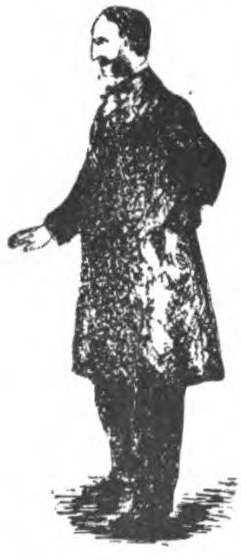
Dan had gone to the speaking. It was one of those old-time lyceum contests. The would-be literateurs of the vicinity had their organization, and on every Thursday evening during the colder months assembled to carry out programmes of a grave and stately nature, mostly on literary, political, and agricultural topics. The occasion on this November eve was the annual prize contest, open to all competitors, when the little surplus in the treasury, weekly reimbursed by a small[Pg 40] collection to defray “incidental and other expenses,” was devoted to prizes which were awarded at the grand declamatory competition. It was the great event of the year. Dan had competed time and time again since his small boyhood, and always without any recognition, although, did people dare to utter their own thoughts, they would call him the best speaker. He had the strong, clear articulation of an orator—calm, composed, yet forcible in utterance. The flash of his keen, black[Pg 41] eye would have held any audience spell-bound, could it once forget the betrayer of Fort Shelby. Although he spoke better this time than ever before, and his preëminence was more pronounced, his name was not read on the prize list. The reason was apparent. A few justice-loving people shrugged their shoulders, looked disapproval and cast sympathizing, if not almost admiring, glances at his strong, honest face. General Brockaway, proud of the results of his instruction, half wanted Dan to win, and even started to rise in his seat to interpose objections to the decisions rendered, but as quickly as cloud follows sunshine, evil impulse follows good, one[Pg 42] thought another, he realized the risk of his prestige and settled back in his seat. The weekly lyceum was continued for years thereafter, but the last prize contest in Shelby town was over.
Two years had passed and all the citizens of Shale Valley were preparing to celebrate in a grand mass assembly on New Year’s eve the twenty-fifth anniversary of the repulse of the Muskigos. This victory of the settlers, following closely upon the disastrous affair of Fort Shelby, practically prevented the complete annihilation of these settlements, and on this account New[Pg 43] Year’s had since been held as a kind of holy day in all Shale Valley. General Brockaway, the hero of many conflicts and the chief functionary of the vicinity, had been selected to deliver the oration on this great occasion.
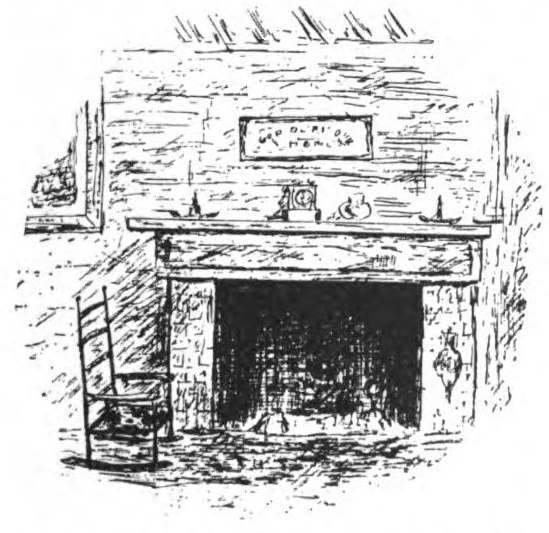
For years he had been engaged, as his leisure hours would permit, in historical investigations, with special reference to the conflicts which were related to this anniversary; and his eloquent words, fired with the zest of experience in the events concerned, were freighted with new and startling facts. One paragraph of that memorable oration struck deep in every heart, and its verification revolutionized the sentiment of[Pg 44] the whole region in one particular at least. It was this:—“I have a grave correction to make, a long continued injury to set right. John Kenashton, who fought by my side with dying heroism at the Creek battle, is not, as was supposed, the betrayer of Shelby Fort. He fell, fighting as he always fought, bravely and loyally, of which fact I have living and indisputable evidence.” At this statement all were amazed. Old men shook their heads, the women looked volumes of doubt, and the young keenly bent their attention. A revelation, mingled with surprise, sadness, and joy, manifested itself in the countenance of the injured son, toward whom all[Pg 45] eyes were turned instantly. The general’s words were accepted as true, and the moral, Puritan sense of that people, realizing their long-continued injustice, was quick in making all possible reparation to the widow and son of the loyal soldier who, for a quarter century, had been[Pg 46] branded as a traitor. The revulsion of feeling was so great that Dan soon became the most popular fellow in the Valley, and all were glad to congratulate him three years afterward, when, on New Year’s eve, he had won the most charming belle in Shale Valley, and become the only heir to General Brockaway’s large estate.

[Pg 47]
[Pg 49]
BY PROXY.
B. C. Taylor.
{Illustrations by M. S. Sherman.}

Harry St. Albans was good looking, that was conceded by all. His father was wealthy, and Harry was the especial admiration of all the young ladies. Whether from his ability to entertain, his good looks, or his father’s wealth, no party or private theatrical of any account was a success without him as principal actor. At college he had been a member of the dramatic[Pg 50] club, and taken one of the leading parts in “The Rivals.”
The wonder of every one was, that Harry did not get married. There surely were several young ladies whom one in his circumstances might be proud of taking for a wife, but he stubbornly adhered to bachelorhood, and prospective mothers-in-law became more abashed as he obstinately resisted the charms of all the young ladies.

It was on the evening of the 30th day of December that Harry was at a party given in honor of Mrs. Slocum’s friend. At first sight of her he[Pg 51] was captivated; she was the belle of the season, they told him, and he did not doubt it. In every movement there was a charming grace, and the mellowest pair of blue eyes seemed to laugh at him all the time. Her words seemed like music to Harry’s ears, with that rich, Italian accent which only a woman of great accomplishments possesses.
When he departed that evening, it was with the greatest reluctance that he left her side. And as he put on his coat and went out into the cold night, his mind still wandered back to a pair of blue eyes. In every window he seemed to see that pair of blue eyes watching him.[Pg 52] What was the trouble? He, a confirmed bachelor, being so agitated by a pretty face and a pair of blue eyes.
Finally he reached his home, and now he was trying to forget the happenings of the evening. But those eyes still pursued him in his sleep. Upon awakening, he knew that it was all a dream; yet not all, for those eyes were a reality.
“Harry,” said his father, “when you are in the city to-day I wish you would call on my old friend, Tom Harris, and give him my best wishes for his success. To-night is New Year’s eve, and he is to open his new theatre, ‘The Grand Royal,’ and his daughter, who has lately[Pg 53] returned from abroad, is to be the leading actress.” Of course Harry would be only too glad to call on his father’s old friend; and the first place he went, on his arrival in the city, was to the private office of “The Grand Royal.”
“Henry St. Albans’ son? Oh! yes, but you will excuse me for a moment. I have some urgent business with my leading actor. Please step into the office for a moment,” replied Manager Harris, when Harry introduced himself.
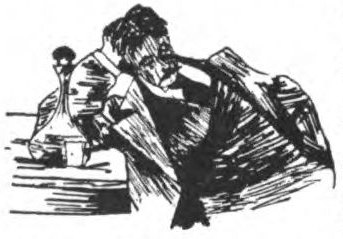
The door was left ajar, and he could not very well help hearing the conversation. It seems that Oscar Redmond, who was one of the most promising actors of the day, had the[Pg 54] failing of a great many actors, and would drink occasionally, yet seldom get intoxicated. That morning, however, he had been out with some of the boys, and as all wished to drink to his success, he had indulged rather too freely, and in such a condition he had come to the manager of “The Grand Royal” and demanded an exorbitant salary, above the amount specified in the contract. Mr. Harris refused, saying that he would rather close his theatre than submit to such an outrage, and Redmond left, declaring that he would not appear that night.
[Pg 55]
“Harry,” began the manager as he returned, “did you”—“Yes, I heard every word, Mr. Harris; but perhaps I can aid you in some way.”
“You?” “Yes, years ago when I was at college I was considered a good impersonator and quick to learn my part,” said Harry, “and if you have no objection I will learn the lines this morning and rehearse with the company in the afternoon.”
“But can you take this part?” said Mr. Harris, with a peculiar accent on the you. “I don’t want to have a bad performance on the opening night, it will almost ruin my reputation.”
“You can rely on me,” said Harry,[Pg 56] “I played just such a part in ‘The Rivals’ when at college, and my friends told me I would miss my calling unless I took the stage for my profession?”
“Harry, you’re a brick!” said the manager, slapping him on the shoulder, “and if you succeed, I’ll do anything in my power for you.”
The rehearsal was gone through with successfully, all being present except the leading lady, who wished to save her strength for the evening performance.
The theatre was crowded, for Oscar Redmond was an excellent actor and a great favorite. Just before going on the stage, Harry was introduced to the leading[Pg 57] actress. He was thunderstruck; it was the lady with the blue eyes.
Never did actor play with more enthusiasm and fervor, never was a love scene more realistic; for the time being Harry forgot he was reciting so many words, but he was pleading his own cause with a love that knew no bounds. If one had been watching Harry with an opera glass, as he knelt at the feet of the heroine, he could have seen him raise a dainty hand to his lips and kiss it. It was all that Harry wanted; for to him it meant that he had been accepted—not by the lady in the play, but by the girl whose blue eyes had won him the night before.
[Pg 58]
The audience was thunderous in its applause, and curtain calls were numerous. The next day Oscar Redmond, shamefaced yet curious, appeared at Mr. Harris’s private office. The morning papers were lavish in their praise of the young actor, and he was anxious to learn the meaning of it. When he was told that his part had been taken so admirably by another, he made his first New Year’s resolution, which he has never broken.
“And now, Mr. Harris,” said Harry, “I ask, as the fulfilment of your promise of yesterday, the hand of the sweetest and best girl that ever lived, that of your daughter.”
“But what of the young lady,[Pg 59] Harry? Surely, she ought to be consulted first.” “She has already accepted me,” replied Harry, “it now remains with you.”
“I am only too glad to give my consent,” said Mr. Harris, and a moment later Harry was receiving congratulations from Oscar Redmond and a score of new made friends.
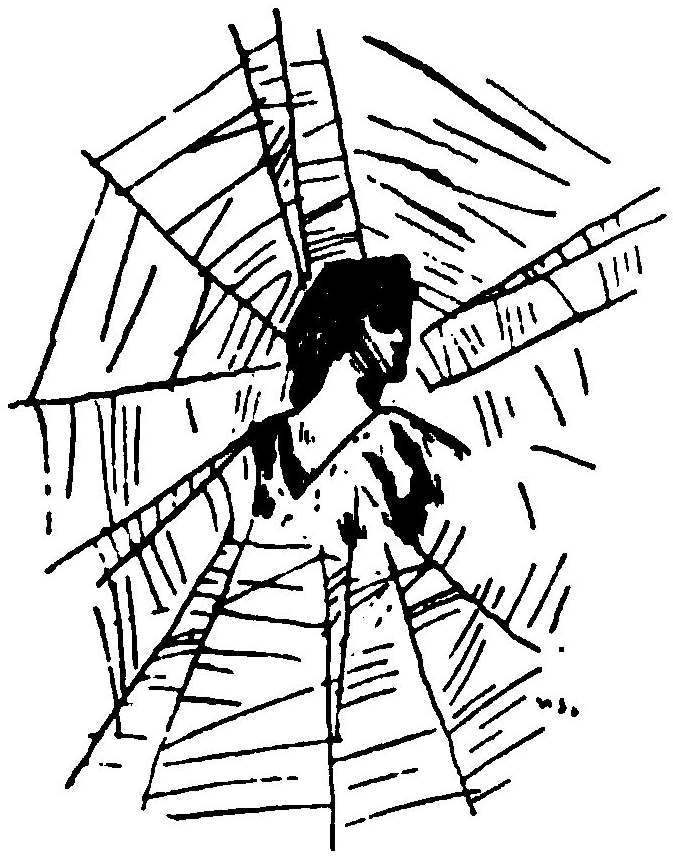
[Pg 61]
[Pg 63]
IN THE SHADOW OF SHEEP MOUNTAIN.
Edwin O. Grover.
{Illustrations by W. B. Plummer.}

The narrow valley which nestled in the lap of the Ossipee and Sheep mountains had already begun to awaken from its summer reverie. The early September days had touched it with their first faint suggestiveness of autumn glories, and the second growth maples in the lowlands[Pg 64] had answered with a few crimson leaves and golden boughs. The little Bear Camp brook, which had hardly moistened the sands of its sinuous banks during the long, dry summer, had begun to flow again. Farther up the valley the saw-mills of Forest City could be heard, starting up after their summer’s idleness.
It were strange if the two shanties, which adorned in their ugliness the western side of Sheep mountain, had not participated in the new life of the little valley. To the passerby they were the same patched and dilapidated huts which they were the day Pete Larkim and Lize Simonds had made that memorable “weddin’[Pg 65] tower” to Bear Camp a couple of months ago. Pete’s “ole man” and “Ria” had flattered themselves that their bit of diplomacy, which had prearranged and carried out Pete’s marriage to Lize, would bring them a happy old age of ease and indolence.
To Pete and Lize, however, their “gittin’ merred” was but a part of their day’s outing at Bear Camp and the Bluff. It meant nothing more than the enjoyment of the peanuts together and the satisfying of their parents’ wishes. Pete still lived with his “paw” and “maw,” and spent his days in hunting, while Lize remained in the Simonds shanty and scolded the half dozen younger[Pg 66] children as they quarrelled over hoecake and hominy. Pete’s “ole man” objected to his spending his whole time in hunting, and Pete had taken to crawling quietly from his bed of straw in the loft long before Bill Larkim was up, and starting on his day’s tramp over the steep sides of Black Snout or Sheep mountain.
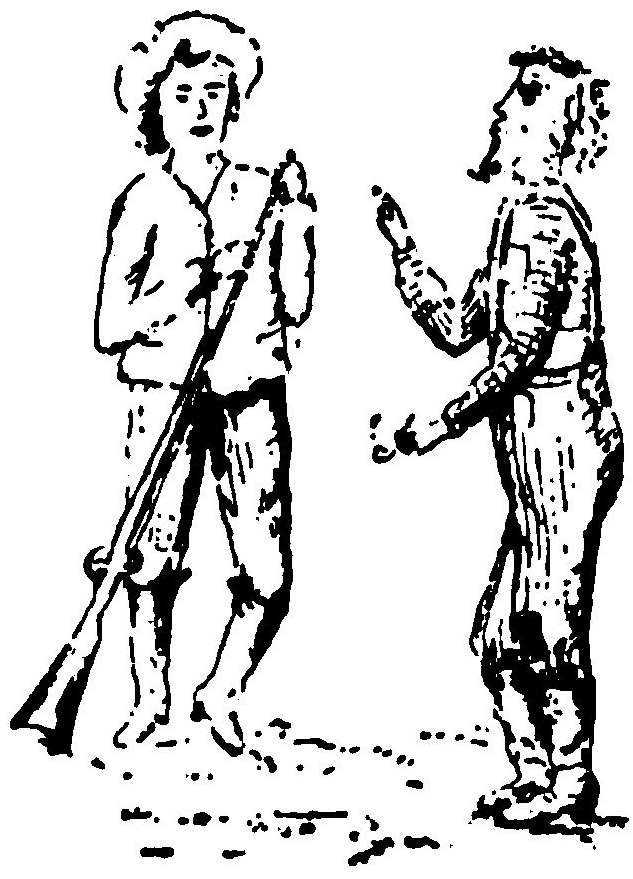
This morning, however, Pete had overslept, and as he took down his gun, Bill Larkim rose from the low bench by the door, where he had taken his accustomed seat to watch for driftwood.
[Pg 67]
“Naow look er hyar, Pete,” he said; “there hain’t no call fer yo’ ter go a huntin’ ev’ry day an’ leave me ter do the hull o’ the work. Yo’ got ’nough plovers yisterday ter las’ a week.”
“Naw thar wa’n’t nuther,” said Pete, with a grin. “They’re all gone a’ready.”
Bill looked up angrily, and blew a cloud of smoke from between his clenched teeth.
“Yo’ can’t fool yer old paw,” he said, with an emphatic gesture toward the Simonds shanty. “I ’low I know who et them plovers yisterday. Jack Simonds got ter feed hisself er starve!” and Bill shook his bushy head of hair and his massive fist[Pg 68] toward the dilapidated shanty, which seemed to tremble in very fear.
Pete, who had been leaning on his gun, tightened his belt as he muttered, “Lize hain’t goin’ ter starve ef Jack Simonds does.”
“Ef Lize hed ruther starve than come ter live with us, as she’d orter, I ’low we can stan’ it,” continued Bill, without noticing the interruption. “What ’d yo’ git merred fur, ef Lize hain’t goin’ ter help me’n yer maw, naow we’re gittin’ old an’ rickety? D’ yo’ hyar, Pete Larkim?” he almost yelled, in his anger. “Thar hain’t one o’ that Simonds gang ez gits another drap from me. Ef yo’ ’re goin’ huntin, yo’ can go; but ef yo’ ’re to feed that cuss of a[Pg 69] Jack Simonds, don’t yo’ never let me ketch yo’ round hyar agin. Yo’ kin take yo’r chice ter s’port yo’r paw an’ maw, ez yo’ orter, or them shiftless Simonds.’”
Pete had stood leaning on his gun, and digging with the toe of his cowhide boot a miniature crater in the soft earth. As his “ole man” sat down sullenly on his bench, Pete buttoned up his leather jacket, and, his gun on his shoulder, shambled down across the brook and out into the clearing beyond.
“Lize hain’t goin’ ter starve,” he kept saying to himself all day, as he tramped through the rocky woods of Sheep mountain in search of game.
It was early evening when Pete[Pg 70] came down with his brace of plover from the open summit of the mountain into the shadows which had settled on the narrow valley.

Just where he was going he did not know; but whenever he thought of returning to his old home, he would seem to hear some one say, “Lize hain’t goin’ ter starve,” and he would stop, as if to listen. He was nearer the shanties than he thought, for once as he paused he heard the voice of some one singing down the mountain path. A moment later Lize appeared, and Pete greeted her with, “Hello, Lize; I’m moughty glad ter see yo’. It’s been kinder[Pg 71] lonesome on the mounting ter day.”
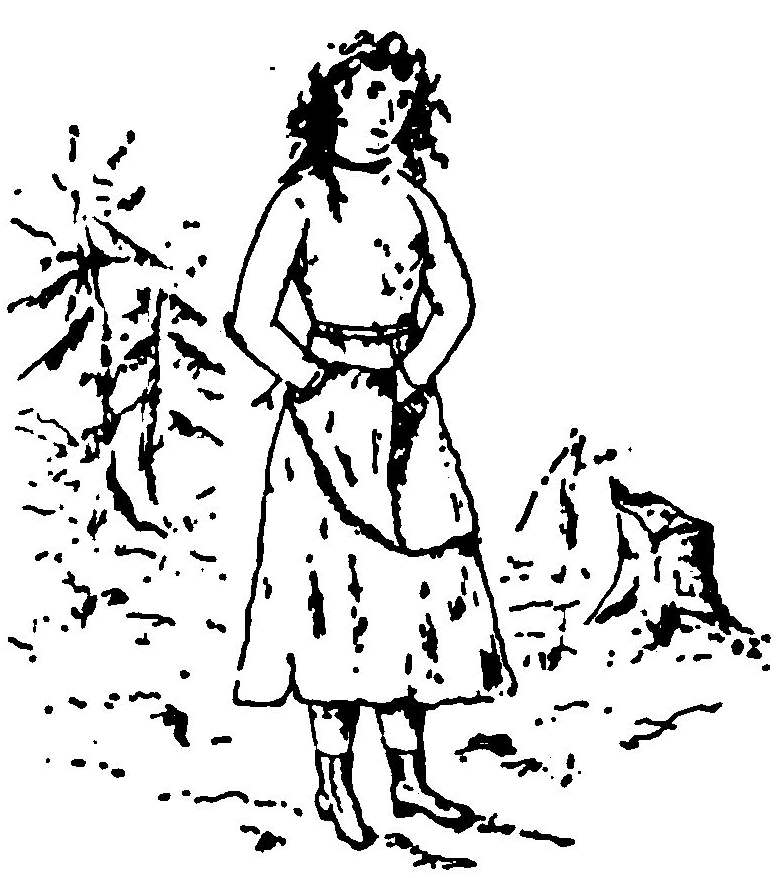
To most, Lize would not have been good looking, but Pete thought he had never seen so beautiful a picture as that of Lize standing in the rocky pathway in her soiled and ragged gown of calico. The leafless twigs of the pathside had caught her hair, and tangled it till it floated bewilderingly about her freckled face. A moment before, Pete was thinking of going home; but now, when[Pg 72] Lize questioned him, he answered quickly, “Goin’ up to Forrest City. Paw ’lows I can’t go home no more ’thout I quit givin’ yo’ game, Lize. An’ yo’ hain’t goin’ to starve, not ef Pete Larkim knows it. Hyar, Lize, take these plovers; they’ll feed yo’ for a day or two. Game’s moughty scarce on the mounting, but I’ll git yo’ suthin, Lize.”
As they walked down the path together, Pete could not help wondering what made him feel so tenderly for Lize. Ever since he could remember, they had made mud pies together, and quarrelled over their dams of dirt and rocks which they had built across the little stream. In fact, their life acquaintance had[Pg 73] not been a particularly pleasant one. But since his father’s interference, Pete had discovered an attraction in Lize as simple, yet as strong, as love can create.
Pete had no difficulty in finding a home among the shanties of the mountain “city.” Day after day he would go after game for Lize, and every evening she would meet him, and they would walk together to the turn of the road, in the cold November twilight. These walks made Pete very happy, for he had never before experienced the joy of doing a kind deed, and Lize was very thankful in her simple way.
The December days had brought the first scuds of snow down the[Pg 74] little valley from the already whitened summits of Ossipee mountains. The walks with Lize became less and less frequent as the snow became deeper, but she never failed to meet Pete at the turn of the mountain road, to receive his gift of game.
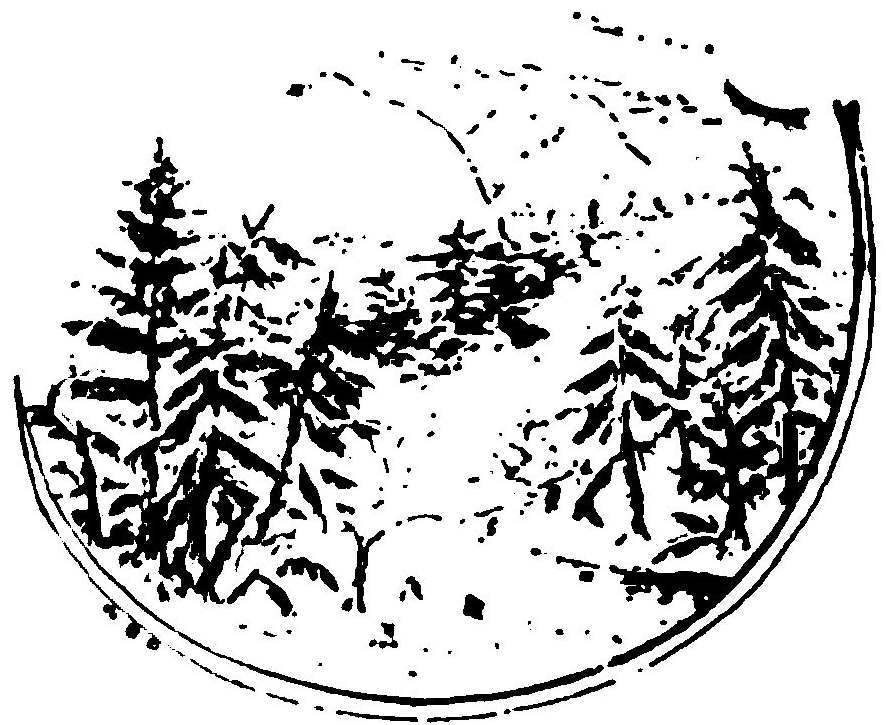
As they met one evening in late December, Pete hung his head in shame. His hands were empty.
“’T ain’t my fault, Lize,” he said, hardly daring to look up. “I hed moughty fine luck up ther mounting[Pg 75] ter-day, an’ war goin’ ter give yo’ a real surprise, fur tomorrer’s Christmas, yo’ know. But paw jest laid fur me up hyar in the brush, and stole ever plover I hed. I’m moughty sorry, Lize, but p’raps”——
“’Tain’t no matter, Pete,” interrupted Lize. “Maw can make a hoe-cake fur Christmas. You’ve ben moughty good ter me, Pete, an’ some day mebbe I can do sumthin’ fer yo’,” and Lize looked at him in simple thankfulness.
“I’m moughty sorry, Lize,” repeated Pete. “But bein’ yo’ hain’t got nothin’ ter eat, can’t yo’ come up ter the celebrashun ter-night? They’re goin’ ter hev a real Christmas tree at the school-house, an’[Pg 76] the parson’s comin’ up from Bar Camp an’ bring er lot o’ presents with him. Mebbe we’ll get one, Lize.”
The deep-set black eyes of Lize lighted up with evident pleasure at the thought.
“Mebbe we will,” she answered. “At enny rate, Pete, I’ll come, shore,” she called after him, as he started towards his “city” home.
It was a great event in the history of the little mountain hamlet, for it was the first time that Christmas had ever condescended to visit the cluster of half a dozen shanties. The lights were all extinguished, save in the ten by twenty school-house where the celebration was being held.
[Pg 77]

As Pete and Lize came in from the cold night air to the warmth and glow of Christmas which filled the stuffy little school-house, they were silent in surprise. It was something unheard of, this giving of presents to friends, much less to strangers; but as they heard the story of the first Christmas, and the message it brought, they began to realize the true meaning of Love. As if it were contagious, it dawned upon Pete for the first time, that his affection and regard for Lize was nothing less than love. He felt as if with the distribution of the presents and the strings of popcorn[Pg 78] something new and strange had come into his rough life.
“I ’low we must er got it, Lize,” said Pete, as together they ate their string of corn. “Maw ’lowed I hed the measles, but she never said nothin’ ’bout my gettin’ in love.”
“’Tain’t no disease, Pete,” said Lize, who had a woman’s intuition and tenderness in her childish heart. “Lovin’ hain’t catchin’ no more’n nothin’. It’s jest er hevin’ er big heart an’ lettin’ er loose, thet’s all.” And Lize flushed a little at her evident display of knowledge. “The parson ’lowed ez how nobody who wa’n’t in love orter git merred,” Lize continued. “’Tain’t that way hyar; leastwise, I hain’t never heard er nobody[Pg 79] bein’ in love up hyar on the mounting.”
Pete was very quiet now. His hat was drawn over his deep-set eyes, and he was playing nervously with the folds in Lize’s calico gown. He was evidently thinking. “Lize,” he said, at length, “I ’low ez we’ve got it, sartin; an’ we’re gittin’ ole, too. I’ve known yo’ fur a long spell, Lize. It’s nigh sixteen year, hain’t it?”
Lize, who could hardly tell her own age, ’lowed it war a moughty long time.
“Wa-al,” said Pete, hesitatingly, “bein’ ez how we’re in love, Lize, let’s git merred fur keeps. Thet wa’n’t no weddin’ last summer, when[Pg 80] paw and maw sent us daown ter Bar Camp, was it, Lize?”
“A weddin’?” asked Lize, “naw; we jest got merred. Thar hain’t no weddin’ ’thout yo’’re in love; an’ we’ve got it naow, Pete, sartin;” and Lize looked surprised at the new thought.
Pete needed no more encouragement, but taking his slouch hat in hand he walked nervously to where the parson was distributing the last of the Christmas presents.
“Me’n Lize ’low ez we hain’t got no call ter bother yo’, parson,” he said, as he looked attentively at a hole in his old hat. “But me’n Lize wan’ ter git merred fur keeps, an’ we ’lowed ez mebbe you’d do it[Pg 81] fur nothin’, ez we hain’t got no present ter-night. It only costs half er dollar,” Pete suggested, as the surprised parson seemed to hesitate.

The mention of the fact that it only cost half a dollar seemed to recall something to the good parson. Before he could answer, however, Pete continued:
“Thet wa’n’t no weddin las’ summer, daown ter Bar Camp, ’cause we wa’n’t in love. But we’ve got it naow, sartin; an’ we wan’ ter git merred fur keeps.” Pete looked up pleadingly.
A moment later, Pete and Lize stood blushingly, hand in hand, before[Pg 82] the group of rough mountaineers. As the parson put this question to Pete, “Do you take this girl for your Christmas present for keeps?” his dark eyes lighted up with a new happiness, and he answered quickly, “I ’low I does, fur keeps.”
There was a movement of surprise in the audience as Pete and Lize went down the narrow aisle, and one or two of the uncouth mountaineers instinctively drew their slouch hats from their heads.
“Whar yo’ goin’, Pete?” inquired Lize, timidly, as they went out of the school-house into the Christmas night.
“Goin’ home, uv co’rse,” he said.[Pg 83] “Paw’ll be moughty pleased, fur I ’low ez he hain’t hed nothin’ ter eat fur mor’’n a month. I tell yo’ what, Lize, I’ll su’prise him with er Christmas present. ’Tain’t allus ez paw gits er Christmas present.”
As Pete and Lize plodded down the valley road, they were very happy in their plans for the future. The dilapidated Larkim shanty seemed a mansion in their unrestrained happiness.
It was nearly midnight when Pete and Lize reached the two shanties which for sixteen years had been all that “home” meant to them. Pete pounded loudly on the rough door of the Larkim shanty, eager to present his angry “ole man” his[Pg 84] Christmas present, which had brought so much happiness to him. In a moment there was a big bushy head thrust out the little square window at the side, and Pete called,—
“Haow are yo’, paw? I’s got a Christmas present fur yo’.”
“Naw yo’ hain’t, nuther,” broke in Bill. “What yo’ doin’ ’round hyar ennyways, yo’ young rascal, yo’? Be that Lize?” he yelled, as he recognized the shivering form at Pete’s side.
“Uv co’rse,” replied Pete. “We’ve got merred for keeps, an’”——
“Merred!” exclaimed Bill, from his window. “Hain’t yo’ been merred all summer, an’ then yo’ lighted out and left yo’ paw and maw ter[Pg 85] starve. Yo’ don’t wan’ ter come sneakin’ ’round hyar, Pete Larkim; if yo’ do, I’ll shoot yo’. I don’t want none o’ yo’ Christmas present.” And the window dropped with a crash.
For a moment Pete was silent with astonishment, till Lize, taking him by the hand, said,—
“Don’t yo’ keer, Pete. It’s moughty hard luck. But I ’low ez haow Bill Simonds hain’t fergot. Yo’ come er long with me, Pete;” and together they sought refuge under the roof of the Simonds shanty.
“Paw hain’t no call ter kick us out,” said Pete, at length. “But I’m moughty glad we went ter the [Pg 87]celebrashun, hain’t yo’, Lize?”
[Pg 86]
[Pg 89]
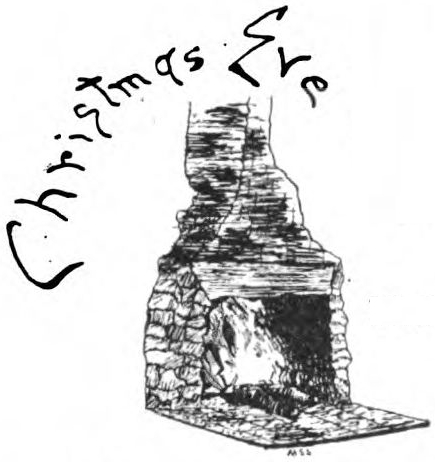
A FANTASY.
R. H. Fletcher.
{Illustrations by M. S. Sherman.}
It had been for me a day of toil and weariness and grief. Sick in body and heart, I returned home late at night and threw myself just as I was upon a couch. In an instant slumber came, but not relief.
I seemed again to tread the weary streets, crowded with the ever-surging[Pg 90] throngs. On the icy-mirror pavements, in the blazing windows of the stores, on the faces of the joyous purchasers,—everywhere was the Christmas glow; and once more in bitterness of spirit I cried out against the hollow mockery and sham.
There was a change. All had vanished save the lights. Nor were they frigid, blinding, cruel, as before; a rosy glow, warm, soft, and kind, filled all the room. Before me stood an angel form, whence streamed the radiance. Beautiful was her flowing robe; beautiful must once have been her face, but now the deep lines about the large, appealing eyes, the quavering of the patient lips,[Pg 91] and the pallor of the sunken cheeks had marred its symmetry and grace.
“Come,” said the figure in a voice plaintive, yet sweet. Unhesitatingly I grasped her hand, and straightway we were flying through the air. The night was inky and awful. The wind moaned dismally as it hurled upon us the huge masses of clouds, threatening and demon-like, and naught but implicit confidence in my conductor preserved me from a sense of loneliness and of desolation, from an utter horror like to that of death.
Long thus we flew, outstripping the swift pursuing blasts, until day bloomed like a rank marsh flower. A gloomy, dismal day.
[Pg 92]
Beyond the vision on either side, a mighty pile stretched; above, it was lost in the low-lying clouds, reaching, perhaps, to the very skies I thought.
Grand the design appeared, yet grand rather in what it should have been than in what it was; for here the walls stood all in moss-grown ruins, as though shaken by some overwhelming earthquake shock, here still unfinished. Everywhere, besides, had been inwrought marble blocks and shattered columns from the ruins that strewed the plain for leagues around. All about were men engaged upon the palace; but though some were earnestly endeavoring to prop the[Pg 93] leaning walls, or to set the great stones firm and true, some, I thought, strove only to cover the gapping seams with useless tinsel, while some were even battering with rams whatever places were the weakest.
Stumbling beneath an arch whose very keystone threatened to drop upon us as we went, and then through dark and ruinous passages, we entered. We emerged into a great hall, whose gaudy, gilded splendor could not long blind the eyes to the bare foundations protruding all about and crumbling in decay. Here a preacher was describing the true Christmas, yet, though his words rang with wondrously[Pg 94] fervid eloquence, they met but little response in the faces of his congregation. Unconsciously my guide approached the speaker, while her splendor became even more intense, until it shone almost like the sun, and yet it might be gazed upon, so soft and friendly was it. But even as it blazed most gloriously it faded, and with a halfstifled sob the angel turned away. To my questioning glance she made reply, “I am Love, and as I come where love is my effulgence grows more bright.”
Through ruined chambers and dark corridors, around black, yawning chasms, up and down great tottering stairways, now we passed,[Pg 95] while I held in terror to the hand of my unmoved conductor. At length we stood in a city street. Remember, all was vague and indefinite to me, for it was but a vision or a dream. In the great surging mass of humanity I noted but two beings, a ragged woman and a little sleeping child which she was bearing in her arms. Plainly she was wandering in search of work. Behind her stood a black, misshapen something, gaunt and grisly, wearing a faint resemblance to the human form, and upon his gloomy forehead I thought I read the impress of this word, “Hunger.” In his hand he held a lash, and with it he even beat the shoulders of the woman,[Pg 96] compelling her to quicken her weary steps; of escape she had no hope. Once she would have sank upon the pavement; the demon strode before with a starved and frightful laugh, and struck the child, which wakened with a moan. As if in answer to its call Love drew near, shining with a subdued but cheerful light. The tense lines upon the woman’s face relaxed; she arose and struggled on, but for a moment only. As the demon Hunger turned and beheld Love standing there he rushed upon her with a fearful cry, then turned and fled. Not an instant was the monster’s place unfilled. Another of his kind, with a still more awful countenance, upon which was written[Pg 97] “Despair,” appeared and struck the woman to the ground; nor did he cease to rain upon her frightful blows, while she glared at him in fierce defiance. I hid my eyes, and when I looked again woman and child had vanished and in their places were two clods of earth.
I fled in terror, for Love was nowhere to be seen; but at length I found her weeping bitterly. The sight of her, even in distress, renewed my courage to behold other things, dreadful though they might be. Yet what need to tell more? Hour after hour we wandered on, and always we found only such scenes of squalid misery or gilded hypocrisy as well might break the[Pg 98] hearts of men though they meet them every day.
At length Love lost the way, and she wandered through fearful ruins until, upon the brink of a fearful chasm just beneath the gloomy clouds, she sank to earth. Near by lay stores of all things necessary for life, yet it was a gruesome place. “Here we must perish,” moaned my guide, and from below I saw grisly Despair rising to drag us down. But even as Love spoke a rushing sound was heard above, and a great glory dissipated all the gloom. Before us stood another angel, bearing in his hands an anchor of jewelled gold. “Did you forget your wings, my sister?” she asked reproachfully.[Pg 99] “How can you die, being immortal?”
Before her gentleness and confidence doubt could not stand. Joyfully we grasped her anchor and rose with her above the clouds. And now I saw that the palace did not reach the skies, but that its topmost story was, oh! so near the earth.
As we passed beyond the walls I read in great letters, carved upon the blocks above the ruinous portal, “The Social Structure of Christ.”
“Kind Hope,” I cried, “if this be all that Christ can do for man, in self-derision do we celebrate his birth to-day.”
She smiled half sadly, and half sweetly, for she could never, I[Pg 100] believe, seem wholly sad. “Many of the stones,” she said, “are fallen. The inscription read at first not ‘of Christ,’ but ‘of Christendom.’ Before the memory of any living now the blocks were laid, and those which have crumbled have fallen, so that many believe the words were ever what they are. But turn and look.”
Far away the clouds had broken and were all gilded by the rising sun. There stood another palace, which seemed much like the first, yet perfect in symmetry and beauty.
“It is of the future,” I heard Hope say; “somewhere—beneath, above, behind, before, within,—somehow, future borders on that place[Pg 101] which some call Heaven, the home of Love, of Knowledge, and of Joy.”
As she ceased to speak I knew I was alone within my chamber. The Christmas bells were ringing merrily, and as I went forth into the cheerful sunshine and saw the pleasant sights that I had passed by in the palace of my dream I felt all my old despair rung out and a cheerful, living hope rung in.
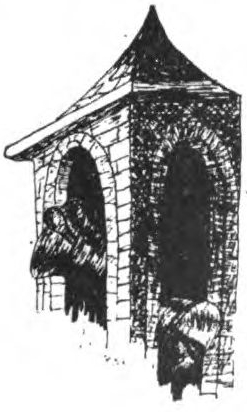
[Pg 103]
[Pg 105]
CLANCY’S HOME-COMING.
I. W. Bishop.
{Illustrations by C. W. Berry.}

Mrs. Clancy glanced around the kitchen of the four-room flat on the top floor of a Broome-street tenement, and wondered why Clancy didn’t come. It was almost 7 o’clock, and he “struck work” at 6. Besides, to-morrow was Christmas, and their turkey depended on Clancy’s ability to get home with his[Pg 106] week’s pay in his pocket. She had not much confidence in this, for he had come home with an empty purse and a full bottle too many times. So Norah Clancy slipped a shawl over her head, and started down stairs. Just as she reached the door, whom should she meet but Officer Dorgan, of the 3d precinct.
“Good avenin’, Mr. Dorgan,” said Norah, her mind full of Mike’s whereabouts.
“Good avenin’, Mrs. Clancy, and could I be doin’ anything for yez?”
“Have yez seen onything of my man?” asked Norah.
Now Dorgan did know where Clancy was, but he was kind-hearted and hated to tell Mrs. Clancy that[Pg 107] her husband was endeavoring to fill himself with bad whiskey at Casey’s gin-palace on the corner. So Dorgan told Mrs. Clancy, in a comforting way, that her man was probably on his way home, and not to worry.
With that, Mrs. Clancy started up stairs, and only stopped to slap one of “them Linkowski brats,” as she called the children of Linkowski, the Polish Jew on the third floor.
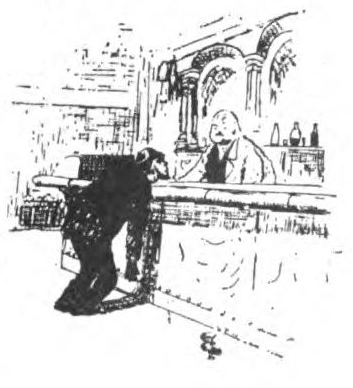
Dorgan started for Clancy when Mrs. Clancy left him, and, true to his instinct, found him trying to hold up[Pg 108] one end of Casey’s long mahogany bar. Dorgan approached him, and began,—
“Clancy, your wife’s a-lookin’ for yez.”
Clancy turned around still clinging to the polished hand-rail, and recognized Dorgan.
“What’ll yez drink?”
“Nothing, Clancy,” said the officer; “but yez better go home.”
Clancy turned around with an assumption of gravity and started for the door, for he was a little afraid of Norah.
She heard him coming, as he stumbled up the stairs, and waited for him. But as he grasped the knob of the door it opened of its[Pg 109] own accord, and Clancy was precipitated against the kitchen table, which was set for supper. Concluding that it would be unwise to move under the existing circumstances, he remained leaning on the table and waited. He had n’t long to wait, however, for Norah began,—
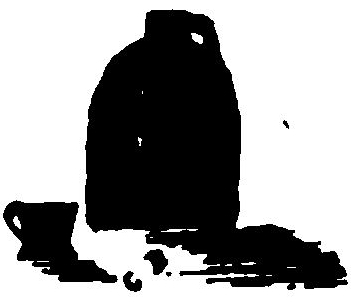
“Mike, give me your money!”
He started to remonstrate, but quailed before the terrible look in her eye, and emptied his pocket on the table.
Norah counted it over.
“Three dollars an’ a half is missin’, Clancy, and yez eat cold corned-bafe to-morrer, av ye plaze.”
[Pg 110]
With this, Mrs. Clancy left the room and slammed the door.
Clancy, left to himself, sat down.
It wasn’t long before Mrs. Clancy returned, and again referred to the turkey which they would not eat on the morrow.
This was the straw that broke the camel’s back. Clancy’s manhood asserted itself, and he arose in a dignified manner and started for the door.
As he reached it he turned around and, with the air of a king bestowing a favor, said, “Mrs. Clancy, yez’ll hov that turkey.”
Clancy walked down stairs and out into the street, where he stood for a moment, irresolute.
[Pg 111]
His ideas on where to procure the turkey he had so rashly promised were very hazy, and, furthermore, he thought Mrs. Clancy had his money. As he reached his hand down into his pocket he felt something. He took it out, gazed at it contemplatively, and bit it. This seemed to satisfy his doubts. He had a quarter!
Then he considered what should be done with it. A quarter would hardly buy a turkey, and a quarter would buy considerable in the line of drink. Still thinking, he strolled down the street.
As he passed his old haunt a large white placard, with the following notice in green letters, attracted his attention:
[Pg 112]
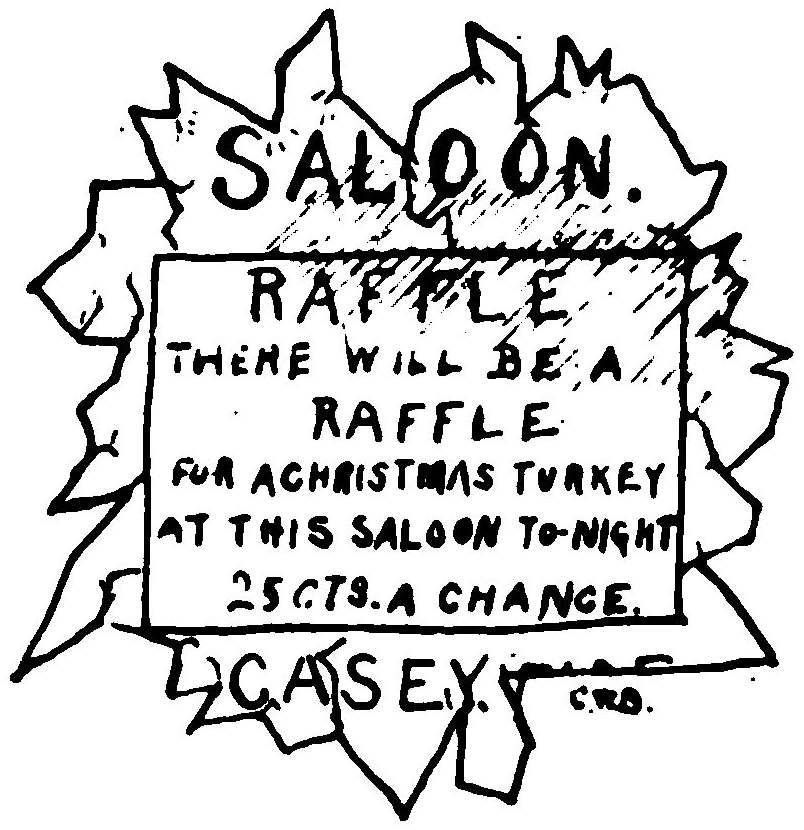
SALOON.
RAFFLE
THERE WILL BE A
RAFFLE
FOR A CHRISTMAS TURKEY
AT THIS SALOON TO-NIGHT
25 CTS. A CHANCE.
CASEY
Clancy did not hesitate, but entered the saloon. With determination in his eye, and all the straight-forwardness that he could put into his gait, he marched up to the bar-tender and inquired about the raffle.
“Ober dere,” said the man, pointing to the other end of the room. “Dere’s anoder chance left.”
[Pg 113]
Clancy, with an eagerness born of despair, deposited his quarter and drew his ticket, No. 13. “Thot may be bad luck,” thought Clancy, “but I’m bound to win.”
Clancy waited with stoical indifference as the numbers were drawn. At last he heard some one in the front of the crowd call out, “Thirteen wins.”
Ten minutes later, Clancy marched proudly into the presence of his wife, and laid his turkey before her.
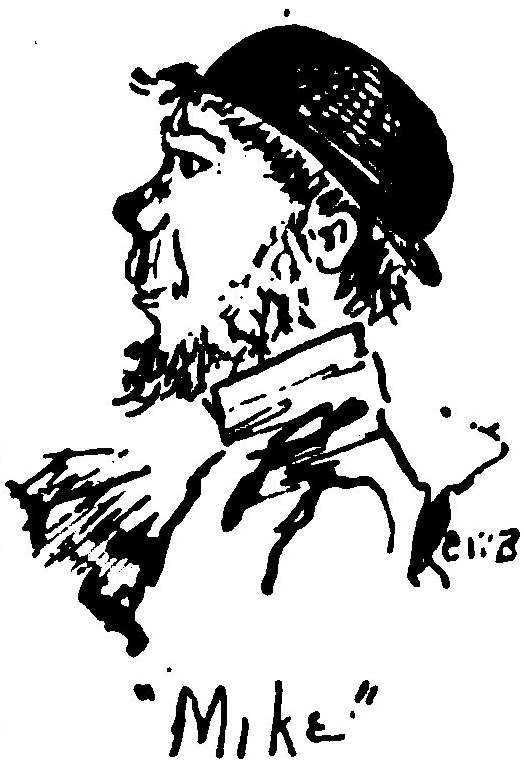
“Mike,” she said, “where did you get that turkey?” “Mike,” she said in a louder[Pg 114] tone, “did you steal that turkey or beg it?”
Mike did not reply to the calumnies of his wife. He was asleep.
[Pg 115]
[Pg 117]
MUSIC HATH CHARMS.
Dana D. Wallace.
{Illustrations by A. W. Stone.}

They sat upon the wide piazza of the St. Sauveur hotel, gazing through the August twilight upon the extended purple of Frenchman’s Bay, the low-lying islands and erratic cliffs that have made Mt. Desert the Mecca of so many pleasure-seekers.
“It is strange that we should have come here together!” exclaimed[Pg 118] Grace Egerton, folding her wraps about her gracefully.
“It is, indeed,” responded Ralph Leighton. “Of course, Grace, we rather hoped to meet you here; but you, George, who would have thought it!”
“It was certainly a pleasant surprise to meet you,” answered George Wardsworth. “I must truly consider myself fortunate,” with an emphasis on the last word, as he glanced at the beautiful face of Grace Egerton.
The glance was intercepted by Ralph, who was becoming annoyed at his friend’s earnest endeavors to be agreeable to his betrothed. It was with great pleasure that[Pg 119] Ralph heard his sister’s voice asking George Wardsworth if the evening air wasn’t becoming a little chilly. Compelled to respond, George gallantly escorted her into the parlors.
Drawing his chair closer, Ralph dwelt with loving words upon his favorite topic, their engagement. “And when that happy day shall come,” he said, “when our engagement is over and real love begins, do you think, Grace, that we will be happier?
“No, Ralph; for it is already over.”
“What! My God—not that, Grace: why, but yesterday you vowed you loved me!”
[Pg 120]
“Yes,” she interrupted, her eyes seeking the ground. “You are right: one day ago I was yours, to-day I am another’s. Then I thought I knew what love was, but I find that I was ignorant of that passion. It is cruel,” she said, “but with my soul in sympathy with another’s, I could not be faithful to you, Ralph. Forget me, as unworthy of your love. I regret the pain I have caused you. But I”——
“Stop,” he cried. “It is true you never loved me. Oh! that I should be deceived by a woman’s love. Go, and may the curse”——but with an angry movement she was gone. With a muttered curse for George Wardsworth, whom he[Pg 121] knew too well was to be Grace’s successful suitor, and almost maddened with grief, he strode down the gravel walk and was lost in the gathering night.
An hour later he returned, haggard and broken-hearted; and with little wonder, for in a few short minutes all that earth held dear had been ruthlessly snatched from him. Yet not all: there was his sister, whom he loved so sincerely, she would be his one comfort in life; but ever before him lingered the vision of Grace Egerton’s lovely face.
As he neared the hotel, he paused and listened. Sweetly floated from the parlors on the still evening air,[Pg 122] the grand words and melodious strains of “Lead, Kindly Light.” It was his sister’s voice, singing as she never had before, so it seemed to him. Almost divine became the music. Such strains as cause us for the moment to forget the outside world with its laughter and tears, and fill our minds with nobler and better thoughts.

And though the singer knew it not, there was one who heard and never forgot that hymn, which for the time soothed his wearied heart as he listened in the silence of the night.
The bustling, good-natured throng,[Pg 123] crowding New York’s busy thoroughfares, and the brilliantly lighted show-windows, told to all that Christmas eve, with all that it suggests, had fallen upon the city.
On Fifth avenue a man hurried past the wealthy and cheerful homes of the most fortunate citizens. The electric light glared upon him and revealed the face of an old friend, Ralph Leighton. But how changed from the handsome Ralph of former days! His unfortunate love affair, followed by the death of that sister whom he so dearly loved, had added many a year to the once youthful face.
“I might do it,” he muttered as he strode along, “I might dash[Pg 124] George Wardsworth from his proud position to the level of a beggar; I wonder if the haughty Grace would come to him then. To-night George Wardsworth stands on the verge of financial ruin; if he can stave off his creditors for another week, the tide will change, and he will remain as he is, wealthy, happy, and loved. To-morrow I will tell the secret to his creditors, they will foreclose, and George Wardsworth will be a penniless man, and I shall have had my revenge.”
Wrapping his ulster more closely about him to keep warm his revengeful spirit, he passed on, but in a short time paused, attracted by the unusually cheerful appearance[Pg 125] of one of the mansions. He gazed into the window. The sight for a moment unnerved him. There seated at the piano amid all the luxury of the Egerton mansion was the one who had made him the hardhearted, revengeful man that he had become,—with her face turned to a sofa on which easily reclined George Wardsworth. How contented and happy they looked!

He had not known where Grace was living, and this sudden discovery maddened him, and he muttered, “I will do it. George Wardsworth, beware!” He started on to carry out his threat, when the sound of music recalled him. As though guided by the hand of fate, Grace had[Pg 126] turned to the piano and run her fingers over the ivory keys. Now instrument and voice chorded together, and softly there came to the revengeful listener, the sweet harmony of Cardinal Newman’s hymn. He waited through it all, and as
lingered and died away, Ralph recalled[Pg 127] the same hymn, that other night, when his hopes had forever vanished. He heard again the voice of his beloved sister. Even now she might be watching him from the star-lit heavens above. How false was he to her trust, meditating such vengeance. He hurried away, humming to himself the words of the sacred hymn, and the business house of Wardsworth & Co. weathered the financial storm.
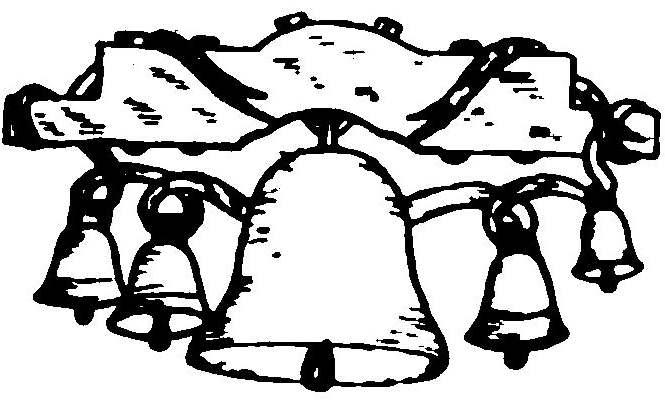
Next day as the glad Christmas bells heralded the story of Christ throughout the land, they mingled[Pg 128] with the merry bells of Grace Egerton’s wedding; but they told not to the world the message which had come into one man’s heart on Christmas eve.
[Pg 129]
[Pg 131]
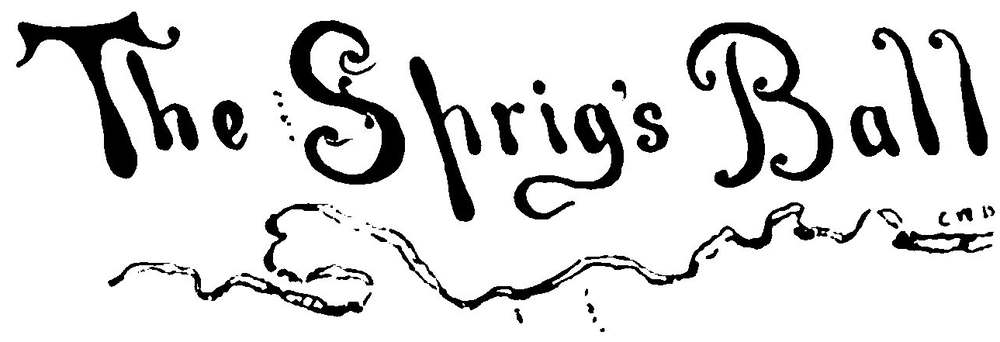
The Sprig’s Ball
William Gibbon.
{Illustrations by C. W. Berry.}

Several years ago, at the junction of two little streams in a fertile section of the cotton district, stood a rickety old blacksmith-shop. The master of its forge, Remington Ingleheart, familiarly known as “Rem,” was a stout, thick-set man, of slave parentage. He was a thrifty young fellow, sure of success at his[Pg 132] trade. For some time he had been “goin’ with a gal,” as he said, about half a mile up one of the little streams, but had never come to any definite understanding, because there had been but one room to the shop. By the time of which we write, however, things were different. An extra apartment was practically completed. The neighbors wondered what “Rem” was up to. When asked about it, he simply answered that he was tired “workin’ an’ sleepin’ in de same place.”
Among all the young negroes of the vicinity, “Rem” had but one particular friend. This was Hicks Gale. Hicks was a sort of blacksmith, too. In rushes of work he[Pg 133] would come over and help “Rem.” One cold December night, “Rem” had a job on hand that must be finished before he turned in. How he wished for Hicks! As if the wish had anything to do with it, Hicks actually appeared about nine o’clock.
“Hullo, Hicks!” exclaimed “Rem.” “Jus’ de man I wants to see. Take de sledge an’ strack a little fur me.”
“Dat ain’t presactly what I come fur,” said Hicks; “but I kin hit you a few licks, anyhow.”
“What’s on hand?” asked “Rem,” thrusting the iron back for a new heat.
“A ball at St. Michael’s, Christmus[Pg 134] eve,” responded Hicks, in much glee. “Sim Sprigs is givin’ it, an’ he tole me fur to tell you to be shore an’ come, an’ fetch Judy. You’ll be dar, won’t you?”
“Coase,” answered “Rem.” “Ever know me to miss a ball?”
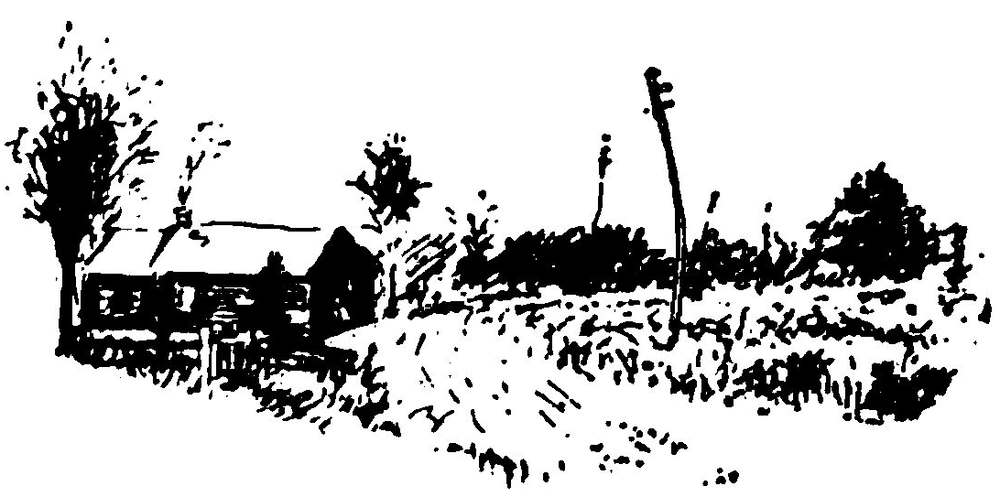
St. Michael’s was a church: a shabby looking structure on the east bank of the large stream formed by the two smaller ones. On the night of the ball, it was pompously illuminated by a number of tallow dips[Pg 135] that peeped uneasily forth from every nook and corner. The dilapidated wooden shutters had been drawn to and fastened with pieces of heavy twine, to keep out the gusty blasts. In the centre was a small stove, which was filled with pine knots till it gave out the necessary degree of heat. The crude benches, on either side of the common aisle, were gathered into a large heap beside the door, to make room for the pedal antics. The most striking feature was the old pulpit. It consisted of a low platform, shut in across the front and half way back on either side by a rough framework of boards. Each projecting corner looked toward a vendor’s[Pg 136] stand, laden with the influences which make “A fool and his money” soon part.
The form of entertainment which the negroes call a ball is rather a comprehensive institution. It may be given on the slightest provocation, and under any auspices whatever, public or private. Ostensibly, the enjoyment consists in dancing to the music of a scratchy fiddle. Really, the interested parties bring together as many of their friends as possible for the purpose of disposing to them of cheap nicknacks and third-class refreshments at a profit of three or four hundred per cent.
By eight o’clock on the Christmas eve in question, St. Michael’s was[Pg 137] full to overflowing. The din of loud talking and yelling was deafening. The voice of Sim Sprigs, the manager, could be heard above that of any one else, exhorting the young bloods to “furmember” their sweethearts, and “treat ’um often.” The idea of treating was of primary importance to the success of the entertainment. It meant that the boys were to lavish their last cent on the girls. In fact, the prompting in the dance was equipped with a special figure for such occasions,—“Promenade to de bar.” The cry of “treat me” could everywhere be heard in powerful soprano tones. If a girl met a boy she knew she invariably asked him to treat her.[Pg 138] When a boy asked a girl to dance, she usually answered, “Yup, uf you’ll treat me fust,” frequently stipulating the amount of the investment.
“Rem” and Judy arrived a little late. The first dance was already in progress. Every one naturally glanced up to see who had entered. The newcomers shook off their slight embarrassment by at once joining in the waltz. Very soon they were as much a part of the crowd as any other couple in the house.
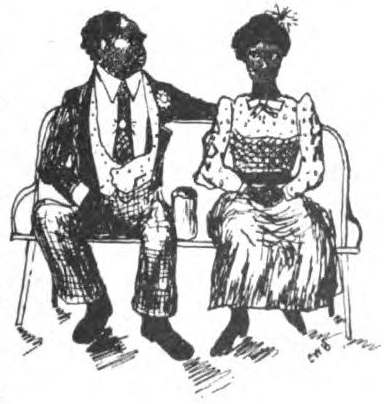
As soon as the opening set closed, there was a general thronging to “de bar.” “Rem” made his purchases and retired. With a large bag in one hand, and Judy on the other arm, he sought the seclusion[Pg 139] of the old pulpit. The inclosure was furnished with only the preacher’s bench, but that had plenty of length for two. “Rem” and Judy sat down, with the bag between them. The former seized a huge piece of cake, and intimated to the latter that she might “dip in.” The second dance was “sot out.” When the third was announced, neither “Rem” nor Judy had engaged a partner. It was natural and pleasant enough for them to dance together again. Further[Pg 140] along, they did not hesitate to pass over several sets at a time. All spare moments were spent in the pulpit. “Rem” kept an abundance of nicknacks on hand, so that they might “dip in,” and relieve the embarrassment of occasional silence. Until quite late the conversation was, on the whole, comparatively general. “Rem” now came a little more to the point, by remarking that he had “bin ’templatin’ takin’ a wife.”
“Is you?” said Judy, simply. “Dat’s good.”
“Jobs is bin putty brisk dis fall,” added “Rem,” “an’ I’s got my yother room all fixed.”
“Is you done picked her out?”[Pg 141] asked Judy, with apparent unconcern.
“Picked her out!” exclaimed “Rem,” “long’s I bin gwine wid you, Judy Marshall, now you ax me who I wants to marry!”
Rosy dawn dispersed the moneychangers from the temple and shamed the lovers from the pulpit. On the following Sunday, St. Michael’s church was packed with an unusually large audience, and the morning service was concluded with a wedding.
“Judy Marshall,” said the preacher, “does you solemnly promise to live up to dis man, lack you ought ter?”
“I does.”
[Pg 142]
“Remington Ingleheart, is you gwine to cherry dis ’oman, whether she’s sick or no?”
“Sho’s God, I be!”
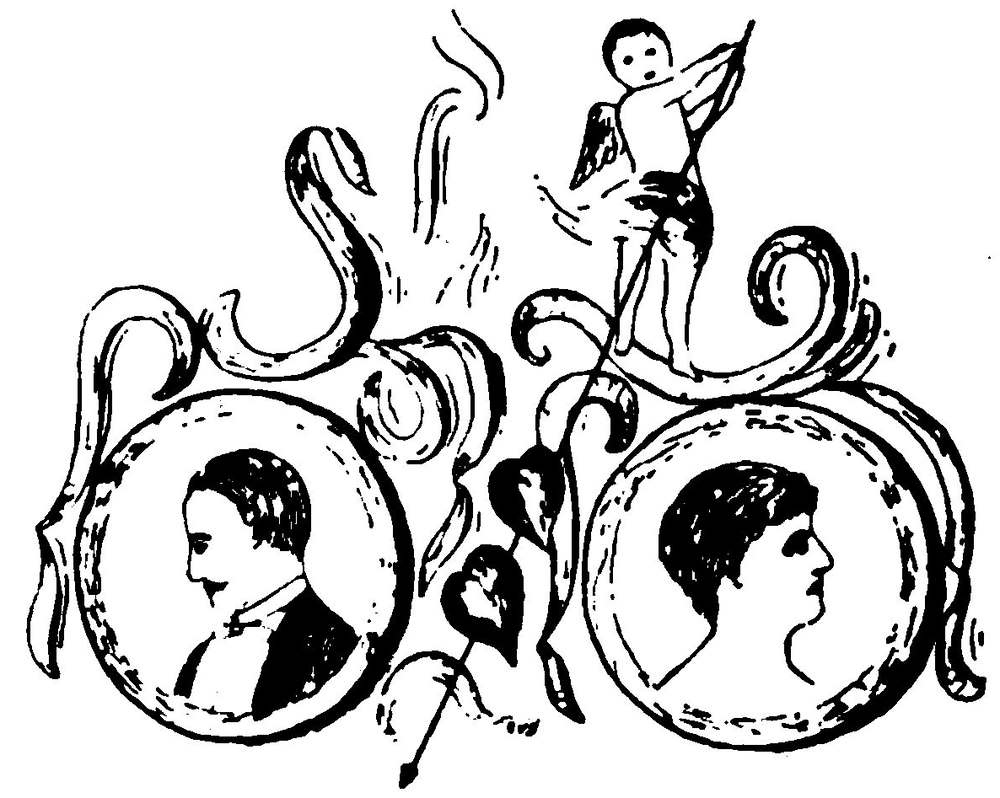
[Pg 143]
[Pg 145]
CHRISTMAS EVE AT THE CLUB.
Harry A. Terrel.
{Illustrations by H. M. Chase.}

“What if she i-s waiting? Ha, ha, ha,—hic! it’ll do her good to wait.”
The speaker was a well dressed, wealthy young aristocrat of New York. It was Christmas eve at the club, and he had sat with his comrades-in-revelry at cards and wine till the early hours of the morning, not thinking of his young wife at home, alone; and when one of the soberer of the company asked if his[Pg 146] wife would be waiting for him, he answered, with a mocking laugh, “Ha, ha, ha—hic! it’ll do her good to wait.”
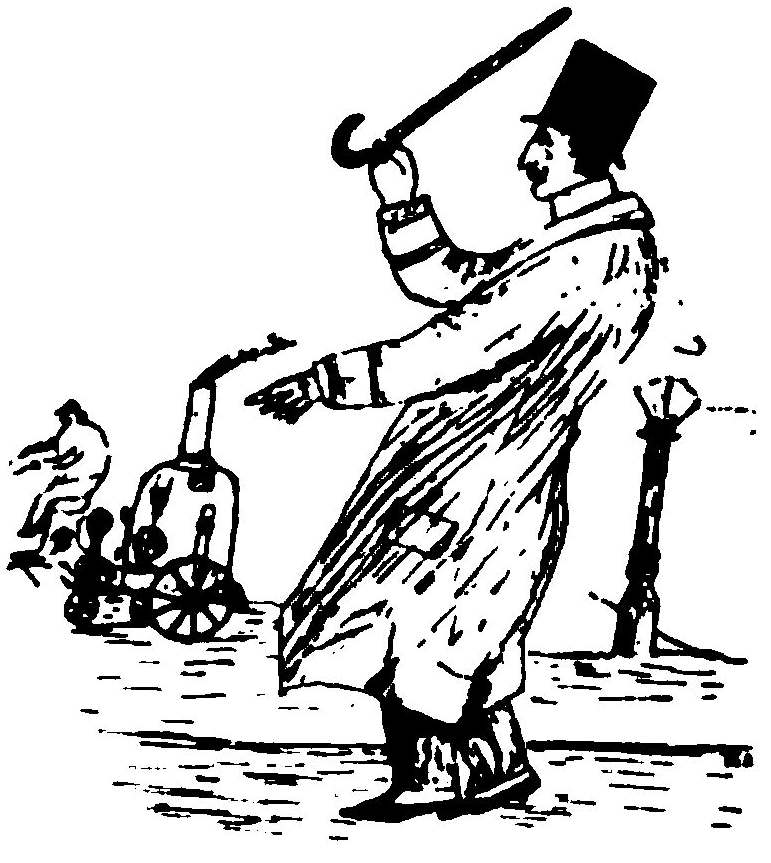
Finally the wine-cup was emptied for the last time, and the party at the club dispersed. The aristocrat wandered unsteadily homeward. A few blocks from his residence a fire-engine thundered past him, and he gave a drunken shout to the drivers, as if to encourage them, and continued on his way.
[Pg 147]
As he turned the corner of the street on which his house stood, almost horror-stricken, he saw it wrapped in flames. The sight sobered him instantly, and, remembering his wife, whom he had left alone seven hours before, he rushed to the spot, and pushing through the crowd which had gathered he cried, “My wife! my God! My wife! where is she! Is she still in there?”
Not heeding the intense heat, he rushed to the building and attempted to climb a ladder resting against the house, but the firemen held him back, and led him to a group of his servants and some officers.
They parted as he came up, and he beheld there, lying on a rough[Pg 148] blanket taken from one of the engine horses, the beautiful, white, but cold form of the one he left a few short hours before in the beauty of womanhood. Oh, the agony of murdered love! He reeled and sank to the ground, his head fairly bursting as he remembered her parting words:
“Don’t leave me to-night, George, this night of all others, Christmas eve, the anniversary of our wedding. You have left me alone every night for months past. Don’t leave me to-night.”
Then flashed across his mind his own words at the club, “What if she is waiting? Ha, ha, ha—hic! it’ll do her good to wait.”
[Pg 149]
It was too much for his wearied brain, and his mind gave way. With the fiendish crackling voice of a maniac he cried, “Ha, ha, ha—hic! it’ll do her good to wait.”

The Ægis.
Founded in 1865, and published annually by editors chosen from the Junior class.
95’s Ægis is Just Out,
and contains the following special features: Portraits and biographical sketches of President Tucker and the late Professor Patterson; the words and music of the Dartmouth Song, by W. B. Segur; fine half-tone pictures of the new Alumni Athletic field; the champion Foot-ball and Athletic teams; base-ball nine, Dramatic club, and Glee club. It is bound in green cloth, with white lettering, and is a model of typographical and press work. Price, $2.00. On sale at Storrs’s bookstore, or by the business manager.
Robert A. Campbell,
Managing Editor.
Robert M. Thornburg,
Business Manager.
The “Lit.” was started in 1886 and aims to represent the literary life of the college. It is published monthly by editors chosen at the end of the sophomore year according to competition during the first two years.
The “Lit.” for ’93-’94
has many new features. Its green and white cover is representative of the college. Each month it contains short stories, essays, a department of college verse, and bright sketches. This volume of “X-mas Sketches” is from the December number of the “Lit.” and shows the work the “Lit.” is doing in developing the literary spirit in college.
For the Alumni.
It contains the most complete alumni department ever published. Each issue has an interesting article by some prominent alumnus upon the war record of the College. The portrait of some Dartmouth hero accompanies each article. These articles are attracting a great deal of attention. The frontispiece of The “Lit.” is the portrait of some prominent alumnus. In its holiday number it presents the steel engraving of Mr. Mark Wentworth Fletcher, Dartmouth’s oldest living graduate.
Every alumnus and undergraduate should support the “Lit.” Price, $2.00 a year.
Edwin O. Grover, Managing Editor.
Ashley K. Hardy, Business Manager.
The Dartmouth.
The College Newspaper.
This is one of the oldest of the college publications, and has the largest circulation of any college paper printed. It is published bi-weekly.
The Dartmouth for ’93-’94
is furnishing all the college news, with complete reports of all foot-ball games and athletic meets. Portraits of prominent alumni appear from time to time. The Alumni department receives especial attention.
The only way to keep in touch with the college is to take The Dartmouth. Price, $2.00 a year, single copies 12 cents. On sale at Storrs’s bookstore.
Fred C. Allen, Managing Editor.
Frank D. Field, Business Manager.
Dartmouth Lyrics.
A collection of Poems from the undergraduate Publications of Dartmouth college.
The first of the undergraduate volumes to appear was the first edition of Dartmouth Lyrics, which was published in 1888, by
Ozora Stearns Davis ’89, and
William Drummond Baker ’89.
It was among the first undergraduate publications of any college, and was a great success. It was bound in green cloth, with gilt top and untrimmed edges. A year ago the edition was exhausted, and it is no longer on sale.
Dartmouth Lyrics.
New Edition Now on Sale.
Containing upwards of 125 selections from the best verse Dartmouth undergraduates have written. Among the contributors are J. A. Bellows ’70, H. H. Piper ’76, H. R. Foster ’82, Richard Hovey ’85, W. D. Quint ’87, F. J. Urquhart ’87, W. B. Forbush ’88, W. F. Gregory ’88, N. M. Hall ’88, F. L. Pattee ’88, N. D. Baker ’89, O. S. Davis ’89, C. F. Robinson ’90, M. P. Thompson ’92, H. B. Metcalf ’93, G. C. Selden ’93, P. E. Stanley ’93, E. O. Grover ’94, Kent Knowlton ’94, R. A. Campbell ’95. Finely illustrated by half-tone pictures of prominent Dartmouth literary men, and familiar Hanover views. Beautifully bound in grey and green, with gilt edges.
Those who have seen the book speak highly of its appearance and make-up. The selections were made with the approval of Prof. C. F. Richardson. Mr. Bertrand A. Smalley ’94, is editor. Price, $1.00. For sale at Storrs’s and Lake & Sanborn’s. Orders by mail will be promptly filled.
| C. C. Merrill ’94, | } | Publishers. |
| B. A. Smalley ’94, |
Dartmouth Sketches.
Selected from the undergraduate publications of Dartmouth College.
The first edition of “The Sketches” was published in December, 1892, by
G. C. Selden ’93, Literary Editor.
G. G. Furnel ’93, Business Editor.
It contained sketches from the “Lit.” and “Dartmouth” from 1843 to 1892. Twenty portraits and views accompanied the sketches. It was bound in green cloth.
Although a large edition was issued it was at once exhausted, and can not now be had.
Dartmouth Sketches.
(Second Edition.)
Selected from the undergraduate publications of Dartmouth College.
To supply the demand after the first edition was exhausted
G. C. Selden ’93 and
A. G. Bugbee ’95
issued a second edition, enlarged and with additional portraits. It contained new sketches by ’95 men, and was issued in two bindings, grey cloth and heavy paper.
Price, $1.00 in cloth; 50 c. in paper.
On sale at Storrs’s Book store, Hanover, N. H.
THE
“In Green and White” Series
Vol. I.
X-mas Sketches from the “Lit.”
The sketches which compose this vest-pocket volume are those which appeared in the Christmas number of the “Lit.” They are illustrated with forty-three thumb-nail sketches made by men in college. It is the first attempt at college magazine illustrating ever attempted. The “X-mas Sketches” indicate the work that is now being done in the artistic and literary line in college.
It is expected that other volumes will be added to this, forming an “In Green and White” series. It is hoped that this little volume may serve as a souvenir of the “Lit.” and an incentive to story writing in college. Price, 50 c.
Edwin O. Grover, Editor.
Dartmouth Athletics.
Just out.
A Complete Illustrated History
Of Athletic sports at Dartmouth from the earliest time to the present.
Contains 350 pages, beside 53 full page half-tone engravings of Dartmouth’s greatest athletes and teams; and is beautifully bound in “green” and gold.
“This unique book is having a remarkable sale.”—New York Tribune.
“The general features of ‘Dartmouth Athletics’ make it of interest to all college men.”—The Tech.
“It is creating general interest among Dartmouth alumni.”—Boston Herald.
“No school library should be without it.”—Merrimack Journal.
“An admirable book.”—Concord Monitor.
Price, $1.50 (postage extra).
Address “Dartmouth Athletics,”
Hanover, N. H.
John Henry Bartlett,
Literary Editor.
John Pearl Gifford,
Business Editor.
This eBook is for the use of anyone anywhere in the United States and most other parts of the world at no cost and with almost no restrictions whatsoever. You may copy it, give it away or re-use it under the terms of the Project Gutenberg License included with this eBook or online at www.gutenberg.org. If you are not located in the United States, you will have to check the laws of the country where you are located before using this eBook.